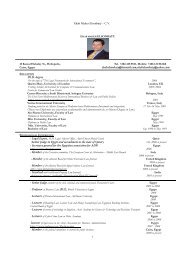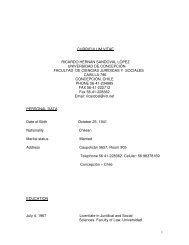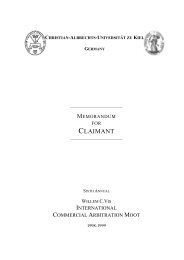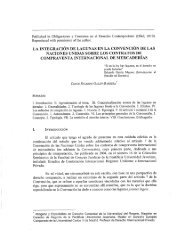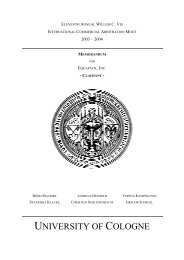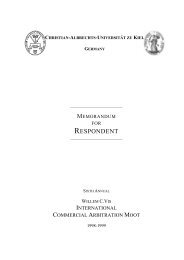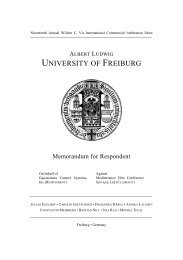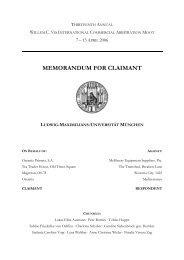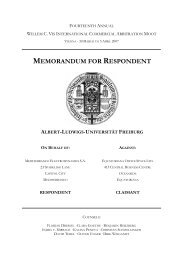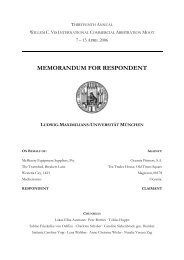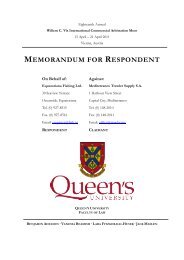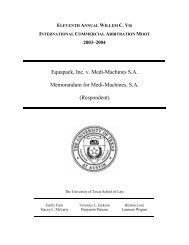CLAIMANT 0800 FINAL 12072006
CLAIMANT 0800 FINAL 12072006
CLAIMANT 0800 FINAL 12072006
You also want an ePaper? Increase the reach of your titles
YUMPU automatically turns print PDFs into web optimized ePapers that Google loves.
ARGUMENT<br />
PART ONE. THE TRIBUNAL HAS JURISDICTION.<br />
1. The Tribunal has jurisdiction over Claimant’s claim. Generally, an arbitral tribunal may assume<br />
jurisdiction over a claim when it determines that a valid arbitration clause exists. According to the<br />
kompetenz-kompetenz principle, it is generally recognized that the tribunal itself is empowered to make<br />
this determination. This Tribunal is competent to rule on its own jurisdiction (I). Moreover, the<br />
Tribunal should determine that a valid arbitration agreement exists (II) and that the parties agreed to<br />
the application of the Romanian Rules (III). Finally, the Tribunal should find that the claim falls<br />
within the scope of the parties’ arbitration agreement and is arbitrable (IV).<br />
I. THE TRIBUNAL IS COMPETENT TO DETERMINE ITS OWN JURISDICTION.<br />
2. This Tribunal is constituted under the Romanian Rules [Letter to the Court of International Commercial<br />
Arbitration attached to the CCI of Romania, 4 Sept. 2006, p. 18]. Under the Romanian Rules, the Tribunal<br />
is competent to rule on jurisdictional objections and therefore may dispose of Respondent’s<br />
contention at Para. 17 of its Answer. Art. 15(2) of the Romanian Rules states in relevant part that<br />
“the Arbitral Tribunal verifies its own authority to settle the dispute.” Similarly, pursuant to Art. 79<br />
of the Romanian Rules, those rules are supplemented by the Romanian Code of Civil Procedure<br />
(“RCCP”). Art. 3433 thereof provides that “the arbitral tribunal shall examine its jurisdiction to<br />
settle the dispute.”<br />
3. Even if the Romanian Rules did not apply to this arbitration, a determination by the Tribunal of its<br />
own jurisdiction is in keeping with established practice in international arbitration [Gaillard/Savage<br />
213; Redfern/Hunter 5-39 to 5-44; see Rule 4(6) of the ICC Rules; see Art. 21 of the UNCITRAL<br />
Arbitration Rules; see Art. 23 of the LCIA Rules]. Indeed, where an arbitration agreement fails expressly<br />
to provide for such authority, it is generally accepted that the authority exists as an inherent power<br />
of the arbitral tribunal [Redfern/Hunter 5-38 (the power of the arbitral tribunal “to investigate its own<br />
jurisdiction…is a power inherent in the appointment of an arbitral tribunal”); Shihata 47; Arfazadeh 46-8].<br />
4. Additionally, the Tribunal may look to the law of the arbitral situs [Redfern/Hunter 2-10, 2-14; Born<br />
84; see also ICC Case No. 5294; Derains/Schwartz 200; Gaillard/Savage 254]. Here the parties chose to<br />
site their arbitration in Danubia, which has adopted the 1985 UNCITRAL Model Law in its entirety<br />
without amendment [Statement of Claim 21]. The above-referenced kompetenz-kompetenz principle is<br />
codified in Art. 16 of Danubia’s Arbitration Law, which states that an arbitral tribunal may “rule on<br />
its own jurisdiction, including any objections to the existence or validity of the arbitration<br />
4



